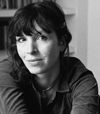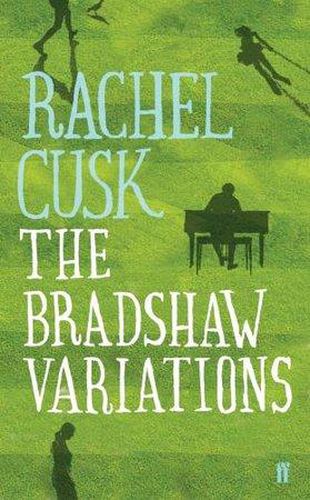Rachel Cusk

Jo Case interviews Rachel Cusk, the acclaimed author of
,
about her follow-up novel
,
.
Your previous novel,
Arlington Park was conceived as a political novel: I always felt that the suburb was merely one of several possible representations of these politics. But it was a world I knew well at the time, a world built around the early phases of family life, in which there are strong - perhaps irresistible - urges to renounce individuality and to atone for the ways in which one has rebelled against an idealised ‘norm’. So it seemed natural to use that as my template. The family world of Bradshaw belongs to a different phase, and is far more the novel’s actual subject. Some of the same issues, of course, recur, but in a less representational guise. In Bradshaw I’m talking about the reality of certain tensions in men and women’s relationships. And about the new moral struggle that characterises this second phase, between discipline and self-expression.
In
Well, my aim certainly isn’t to lie! I don’t know whether the world is ‘really’ as I portray it. What I offer in my writing is an experience of honesty as something both perilous and rewarding. My hope is that the reader will recognise in that mixture something true of him or herself.
The Bradshaw family home is “thick with subconscious life, like a forest in a fairy tale”. That’s a wonderful image. How does that subconscious life of the family play out in the novel? How do the roles people play within the family they grow up in influence the people they become?
One of the great difficulties I encountered in writing this book was finding ways to describe parts of life that are deeply rooted in sub- or even pre-conscious experiences. That was why I attempted to use musical form as a template. The predetermined aspect of music - the strong articulation of the ‘form’ and the way it precedes content - did and does seem analogous to me. It seems true to me that people suffer great damage when they try to rid themselves of the aspect of form that underlies identity. And yet to accept these as the outer boundaries of personal experience is extremely difficult. In my book, the attempt to find beauty within limitation - and the extreme self-discipline this requires - is something all the characters are bound up with.
Somewhere in the depths of Claudia’s consciousness swim the unanswered questions: “What is the right way to live? What is the value of success? … if love is selfish, can it still be considered to be love?” How important are these questions to the novel as a whole?
I suppose those are the questions that can be asked - that have to be asked - as part of a process of acceptance. In Claudia’s case, they are being asked rather in the old spirit of Arlington Park, the spirit of individual powerlessness. This is the moral uncertainty which comes with the renunciation of personal identity.
You’re very good at capturing the rhythms of how people speak; the way conversations are so often defined by the subtext – what people don’t say, or the tones they use – as much as what they do say. Is there a lot of work involved in getting that balance right, and making the dialogue ring true? Or does it come naturally?
For me, somewhat oddly perhaps, it is in dialogue that I make my greatest efforts towards honesty. Working out exactly how the way a person speaks makes me feel - for reasons that go back to my very earliest memories - is absolutely central to my process. But I also find other people extremely useful as commentators in this area. I am someone who is completely unable to give a ready reply to a verbal challenge, so I am rather fascinated by people who can. I spend a lot of time not just listening to what a person says but listening to how other people interpret what’s been said. For me, what I think is absolutely unrelated to what I say. And so I can’t understand what other people are saying either. It’s a sort of disability, I suppose, on my part: I get completely the wrong end of the stick, and have to work very hard to compensate for it.
The gap between the imagined and the real, the imitation and the authentic, seems a central thread of the novel. Often, characters are surprised by the gap between the idea of something and its reality. At other times, characters fail to really see or understand each other because their pre-conceived perceptions stand in the way. What appealed to you about exploring these ideas in this book?
Well, this is something I’ve got more interested in lately. I teach an MA in creative writing, and my students are so often people who have been led to an interest in writing by exactly those questions of authenticity. The questions relate to life, but these people sense that the answers are to be found in art. My teaching has led me to conclude that there is a particular time in life when it becomes imperative to bring the two together, to reconsider experience via the discipline and morality of art.
Tonie and Thomas find it difficult to swap roles, locating her primarily in the world of work, him primarily in the home, with no defining outside identity. Do you think this is about social conditioning, inherent gender differences, or simply a problem these characters have?
I’ve been very struck in adult life by the difficulty people seem to have challenging tradition. There seems to come a point at which being different from one’s parents or from a traditional ‘norm’ becomes virtually impossible, like swimming against a current that gets stronger and stronger the older you get. And there’s a great deal of fear, too, involved in striking out on your own and defying the unwritten rules you were brought up with. Many women know consciously that there’s nothing wrong with them working as mothers, but nonetheless they feel they’re doing something wrong, something that will have vaguely terrible consequences. And it’s the same, perhaps, for men as domestic creatures. So I wanted my characters to inhabit exactly this place between knowing and feeling, and for the sense of a punishment to be fully realised.
Though they both have their issues, it seemed to me that Thomas finds it more difficult to inhabit the role of primary caretaker than Tonie does to be the breadwinner. He tries hard, but finds it hard to relinquish his ego and priorities to the extent that his wife was able to in the role. Do you think this was the case? If so, why?
Well, a woman can become very powerful through motherhood. I’m not sure a man is empowered by the world of work in the same way. A certain kind of woman, once she’s had a child, can feel capable of anything, including great destructiveness. But I wanted to show that Thomas was on the way to an important, and essentially virtuous, breakthrough in his relationship with his child. What defeats him in the end is the fear I was describing earlier; the sense that he is being punished for a transgression.
Tonie’s mother reflects that children come into the world “pure and new, unmarked” and “somehow become knotted up, full of snags and resistances”. Thomas says of Alexa that “he is forming her out of the substance of what she already is”. These seem to be two very different, almost contradictory, approaches to parenting. One is about forming a child in one’s preferred mould, the other is about guiding them to be their best self. Were you hoping to explore (or illustrate) these differing approaches in the different family scenarios?
Yes, absolutely. My own upbringing was very much the first sort: the development of individual identity was configured as a form of defiance, and one was made to feel great shame and guilt about it. And the domestic equality towards which men and women - or at least some of them - are slowly striving has this immeasurable benefit in terms of a reduction of parental authority and a greater respect for the child’s self.
You say that your motherhood memoir,
I certainly didn’t know how far I was trespassing into the unsaid and the unsayable when I wrote A Life’s Work. I didn’t really know anything at all about the culture of motherhood. All I knew was how it had been for me, and an ability to be honest about personal experience has always formed the substance of my writing process. So I was rather taken aback when it didn’t work at all in the usual way; and worse, when a sort of witch-hunt ensued in which this idea of a mother as bleak or depressive really seemed to terrorise people. It was my first experience of something that is very ugly in human nature - the primitive operation of the taboo, as you say - and it certainly made me unhappy for a while. I saw it as a small example of a much greater problem of intolerance. And of course, in the end, it is possible to feel sorry for those who are intolerant, and to feel glad that my book still exists in spite of them. It continues to do its job, I think; I still hear from new mothers who have found it and been fortified by it.



